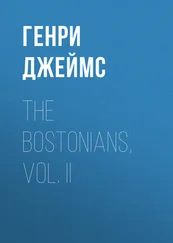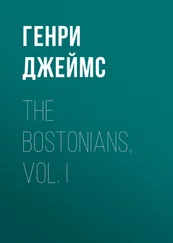Генри Джеймс - The Letters of Henry James. Vol. II
Здесь есть возможность читать онлайн «Генри Джеймс - The Letters of Henry James. Vol. II» — ознакомительный отрывок электронной книги совершенно бесплатно, а после прочтения отрывка купить полную версию. В некоторых случаях можно слушать аудио, скачать через торрент в формате fb2 и присутствует краткое содержание. Жанр: Биографии и Мемуары, foreign_antique, foreign_prose, на английском языке. Описание произведения, (предисловие) а так же отзывы посетителей доступны на портале библиотеки ЛибКат.
- Название:The Letters of Henry James. Vol. II
- Автор:
- Жанр:
- Год:неизвестен
- ISBN:нет данных
- Рейтинг книги:4 / 5. Голосов: 1
-
Избранное:Добавить в избранное
- Отзывы:
-
Ваша оценка:
- 80
- 1
- 2
- 3
- 4
- 5
The Letters of Henry James. Vol. II: краткое содержание, описание и аннотация
Предлагаем к чтению аннотацию, описание, краткое содержание или предисловие (зависит от того, что написал сам автор книги «The Letters of Henry James. Vol. II»). Если вы не нашли необходимую информацию о книге — напишите в комментариях, мы постараемся отыскать её.
The Letters of Henry James. Vol. II — читать онлайн ознакомительный отрывок
Ниже представлен текст книги, разбитый по страницам. Система сохранения места последней прочитанной страницы, позволяет с удобством читать онлайн бесплатно книгу «The Letters of Henry James. Vol. II», без необходимости каждый раз заново искать на чём Вы остановились. Поставьте закладку, и сможете в любой момент перейти на страницу, на которой закончили чтение.
Интервал:
Закладка:
To Madame Wagnière
The name of this correspondent recalls a meeting at Florence, described in an early letter (vol. i, p. 28). Madame Wagnière (born Huntington) was now living in Switzerland.
Palazzo Barbaro, Venice. June 23rd, 1907.Dear Laura Wagnière,
I have waited since getting your good note to have the right moment and right light for casting the right sort of longing lingering look on the little house with the " Giardinetto " on the Canal Grande, to the right of Guggenheim as you face Guggenheim. I hung about it yesterday afternoon in the gondola with Mrs. Curtis, and we both thought it very charming and desirable, only that she has (perhaps a little vaguely) heard it spoken of as "damp" which I confess it looks to me just a trifle. However, this may be the vainest of calumnies. It does look expensive and also a trifle contracted, and is at present clearly occupied and with no outward trace of being to let about it at all. For myself, in this paradise of great household spaces (I mean Venice generally), I kind of feel that even the bribe of the Canal Grande and a giardinetto together wouldn't quite reconcile me to the purgatory of a very small, really (and not merely relatively) small house.... Mrs. Curtis is eloquent on the sacrifices one must make (to a high rent here) if one must have, for "smartness," the "Canal Grande" at any price. She makes me feel afresh what I've always felt, that what I should probably do with my own available ninepence would be to put up with some large marble halls in some comparatively modest or remote locality, especially della parte di fondamenta nuova , etc.; that is, so I got there air and breeze and light and pulizia and a dozen other conveniences! In fine, the place you covet is no doubt a dear little "fancy" place; but as to the question of "coming to Venice" if one can, I have but a single passionate emotion, a thousand times Yes! It would be for me, I feel, in certain circumstances (were I free, with a hundred other facts of my life different,) the solution of all my questions, and the consolation of my declining years. Never has the whole place seemed to me sweeter, dearer, diviner . It leaves everything else out in the cold. I wish I could dream of coming to me mettre dans mes meubles (except that my meubles would look so awful here!) beside you. I presume to enter into it with a yearning sympathy. Happy you to be able even to discuss it....
This place and this large cool upper floor of the Barbaro, with all the space practically to myself, and draughts and scirocco airs playing over me indecently undressed, is more than ever delicious and unique.... The breath of the lagoon still plays up, but I mingle too much of another fluid with my ink, and I have no more clothes to take off.... I greet affectionately, yes affectionately, kind Henry, and the exquisite gold-haired maiden, and I am, dear Laura Wagnière, your very faithful old friend,
HENRY JAMES.To Mrs. Wharton
The Vicomte Robert d'Humières, poet and essayist, fell in action in France, April 26, 1915.
Lamb House, Rye. August 11th, 1907.My dear Edith and my dear Edward,
The d'Humières have just been lunching with me, and that has so reknotted the silver cord that stretched so tense from the first days of last March to the first of those of May—wasn't it?—that I feel it a folly in addition to a shame not yet to have written to you (as I have been daily and hourly yearning to do) ever since my return from Italy about a month ago. You flung me the handkerchief, Edith, just at that time—literally cast it at my feet: it met me, exactly, bounding—rebounding—from my hall-table as I recrossed my threshold after my long absence; which fact makes this tardy response, I am well aware, all the more graceless. And then came the charming little picture-card of the poor Lamb House hack grinding out his patient prose under your light lash and dear Walter B.'s—which should have accelerated my production to the point of its breaking in waves at your feet: and yet it's only to-night that my overburdened spirit—pushing its way, ever since my return, through the accumulations and arrears, in every sort, of absence—puts pen to paper for your especial benefit—if benefit it be. The charming d'Humières both, as I say, touring— training —in England, through horrid wind and weather, with a bonne grace and a wit and a Parisianism worthy of a better cause, amiably lunched with me a couple of days since on their way from town to Folkestone, and so back to Plassac (don't you like "Plassac," down in our dear old Gascony?) the seat of M. de Dampierre—to whom, à ce qu'il paraît, that day at luncheon we were all exquisitely sympathetic! Well, it threw back the bridge across the gulfs and the months, even to the very spot where the great nobly-clanging glass door used to open to the arrested, the engulfing and disgorging car—for we sat in my little garden here and talked about you galore and kind of made plans (wild vain dreams, though I didn't let them see it!) for our all somehow being together again.... But oh, I should like to remount the stream of time much further back than their passage here—if it weren't (as it somehow always is when I get at urgent letters) ever so much past midnight. It was only with my final return hither that my deep draught of riotous living came to an end, and as the cup had originally been held to my lips all by your hands I somehow felt in presence of your interest and sympathy up to the very last, and as if you absolutely should have been avertie from day to day—I did the matter that justice at least. Too much of the story has by this time dropped out; but there are bits I wish I could save for you.... But I must break off—it's 1.15 a.m.!
Aug. 12th. I wrote you last from Rome, I think—didn't I? but it was after that that I heard of your having had at the last awful delays and complications, awful strike -botherations, over your sailing. I knew nothing of them at the time.... I can only hope that the horrid memory of it has been brushed and blown away for you by the wind of your American kilometres. I remained in Rome—for myself—a goodish while after last writing you, and there were charming moments, faint reverberations of the old-time refrains—with a happy tendency of the superfluous, the incongruous crew to take its departure as the summer came on; yet I feel that I shouldn't care if I never saw the perverted place again, were it not for the memory of four or five adorable occasions—charming chances—enjoyed by the bounty of the Filippis.... My point is that they carried me in their wondrous car (he drove it himself all the way from Paris via Macerata, and with four or five more picked-up inmates!) first to two or three adorable Roman excursions—to Fiumicino, e.g., where we crossed the Tiber on a medieval raft and then had tea—out of a Piccadilly tea-basket—on the cool sea-sand, and for a divine day to Subiaco, the unutterable, where I had never been; and then, second down to Naples (where we spent two days) and back; going by the mountains (the valleys really) and Monte Cassino, and returning by the sea—i.e. by Gaeta, Terracina, the Pontine Marshes and the Castelli—quite an ineffable experience. This brought home to me with an intimacy and a penetration unprecedented how incomparably the old coquine of an Italy is the most beautiful country in the world—of a beauty (and an interest and complexity of beauty) so far beyond any other that none other is worth talking about. The day we came down from Posilipo in the early June morning (getting out of Naples and round about by that end—the road from Capua on, coming, is archi-damnable) is a memory of splendour and style and heroic elegance I never shall lose—and never shall renew! No—you will come in for it and Cook will picture it up, bless him, repeatedly—but I have drunk and turned the glass upside down—or rather I have placed it under my heel and smashed it—and the Gipsy life with it!—for ever. (Apropos of smashes, two or three days after we had crossed the level crossing of Caianello, near Caserta, seven Neapolitan "smarts" were all killed dead—and this by no coming of the train, but simply by furious reckless driving and a deviation, a slip , that dashed them against a rock and made an instant end. The Italian driving is crapulous , and the roads mostly not good enough.) But I mustn't expatiate. I wish I were younger. But for that matter the "State Line" would do me well enough this evening—for it's again the stroke of midnight. If it weren't I would tell you more. Yes, I wish I were to be seated with you to-morrow—catching the breeze-borne "burr" from under Cook's fine nose! How is Gross, dear woman, and how are Mitou and Nicette—whom I missed so at Monte Cassino? I spent four days—out from Florence—at Ned Boit's wondrous—really quite divine "eyrie" of Cernitoio, over against Vallombrosa, a dream of Tuscan loveliness and a really admirable séjour.... I spent at the last two divine weeks in Venice—at the Barbaro. I don't care, frankly, if I never see the vulgarized Rome or Florence again, but Venice never seemed to me more loveable—though the vaporetto rages. They keep their cars at Mestre! and I am devotedly yours both,
Читать дальшеИнтервал:
Закладка:
Похожие книги на «The Letters of Henry James. Vol. II»
Представляем Вашему вниманию похожие книги на «The Letters of Henry James. Vol. II» списком для выбора. Мы отобрали схожую по названию и смыслу литературу в надежде предоставить читателям больше вариантов отыскать новые, интересные, ещё непрочитанные произведения.
Обсуждение, отзывы о книге «The Letters of Henry James. Vol. II» и просто собственные мнения читателей. Оставьте ваши комментарии, напишите, что Вы думаете о произведении, его смысле или главных героях. Укажите что конкретно понравилось, а что нет, и почему Вы так считаете.












